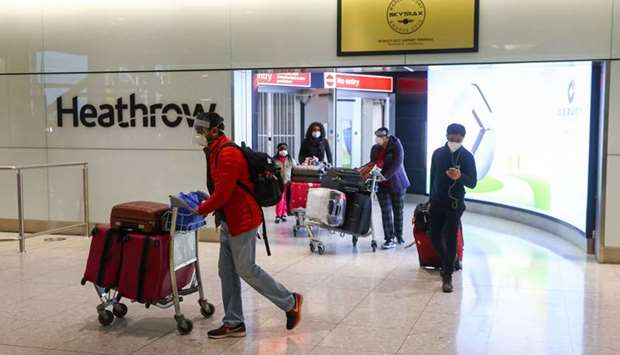Aviation Page - Beyond the Tarmac
* Safely reopening borders and reconnecting the world – on hold?
The aviation industry suffered catastrophe in 2020 as international travel almost came to a complete standstill last year due to the Covid-19 pandemic.
Global passenger traffic declined 65.9% last year compared to 2019.
International passenger demand dropped 75.6% and domestic demand fell 48.8% below 2019 levels.
Despite a rise in confidence in air travel as a result of testing and vaccination, a new Airports Council International (ACI) world analysis outlines an estimate of continued severe revenue losses for the aviation industry in 2021.
The analysis shows that 4.7bn fewer passengers are forecast to travel by the end of 2021 compared to the projected baseline, representing a decline of 47.5% in global passenger traffic.
This reduction in travellers is estimated to equate to a loss in revenue of more than $94bn by the end of 2021, cutting in half expectations compared to the projected baseline.
The aviation industry ended 2020 with hopes that the rollout of coronavirus vaccines would signal the return of many personal freedoms, including the freedom to travel.
The aviation sector now plays a vital role transporting vaccines to every nook and corner of the globe — the largest single transport challenge in its history.
“Airlines would like nothing more than to get back to the business of bringing our world together. And I believe that people are eager to take to the skies as well. Almost every conversation that I have with someone outside the industry eventually includes a question about when we can start flying again.
“Some want to re-connect with friends and family. Others are pursuing a vital business or educational opportunity. And many just want to refresh by exploring another part of the world,” points out Willie Walsh, IATA Director General.
Walsh noted that for now, however, pretty much all these desires are on hold. The focus of governments is almost universally on containing the spread of the virus across borders.
“There is little hope of an imminent return to normal. We understand that. But we want to be prepared to reconnect the world as soon as governments believe it is safe to do so.”
Getting the world flying again is about much more than self-interest. The livelihoods of 11.3mn people around the world directly depend on aviation. Another 76.4mn more jobs are in aviation-dependent tourism.
And considering aviation’s role in fostering trade and cross-border investment, it’s not difficult to see that air connectivity will be needed to energise the global economic recovery from Covid-19.
Bio-safety, vaccines, testing, standards and travel pass have been touted as measures in a global framework recommended for re-connecting the world.
Since the pandemic began, the global body of airlines IATA together with other industry stakeholders and the International Civil Aviation Organisation (ICAO), have developed step-by-step processes to minimise the risk of infection during air travel.
These bio-safety measures have already been largely implemented by regulators throughout the world.
Each person vaccinated brings the world a step closer to defeating the virus. And once healthcare workers and vulnerable groups in society (the elderly or those with health pre-conditions) have been vaccinated, science tells us that the main risks will have been averted.
In fact, several governments have identified this as the point where they will consider lifting travel restrictions, including quarantine, Walsh noted recently.
Globally, testing capacities are rapidly expanding. That’s good because more governments are requiring travellers to be tested. It is also a fact that confidence in the various testing methodologies is strengthening — including both PCR and Antigen.
“Whatever governments plans are, we’ll be ready to help them with the IATA Travel Pass. It is the digital infrastructure to support a world in which we need verified health credentials to travel. The IATA Travel Pass will give travellers the solution to securely store and present their verified vaccine or testing information to governments and airlines as needed.
“IATA has been in the business of providing entry requirement information for decades. And global standards are in our DNA. So, we are very confident that the IATA Travel Pass will be a reliable solution for all concerned,” said Walsh, who took over as IATA chief recently.
That said, the industry captains are aware of the challenges involved in implementing measures to safely reopen borders around the world.
That’s because governments will definitely want to ensure that any re-opening of borders does not bring the risk of importing Covid-19. Aviation’s history since its inception a century ago testifies to its expertise at effectively managing risks while growing connectivity.
The air transport industry in partnership with other aviation stakeholders and safety regulators, have made aviation the safest form of long-distance travel the world has ever known.
Joint global efforts to beat the virus should help find a way to extend this success into the Covid-19 world.
Air transport is a vital industry that contributes substantially to economic development and the improvement of living standards. The role of the aviation industry in commerce, trade and transport infrastructure makes it indispensable to the global economy.
“This virus will not separate us forever. There is light at the end of this very long tunnel. After a year of lockdowns, our mission to connect people globally is more important than ever. We are the business of freedom that we all long for,” Walsh noted.
* Pratap John is Business Editor at Gulf Times. Twitter handle: @PratapJohn


